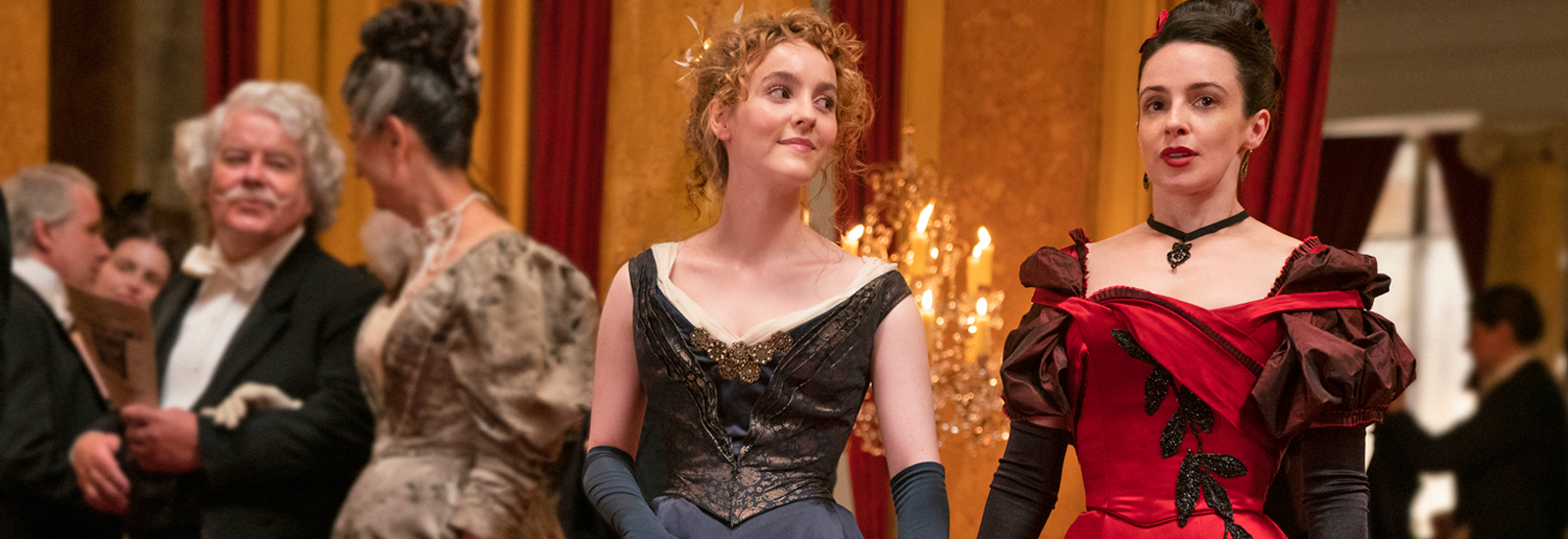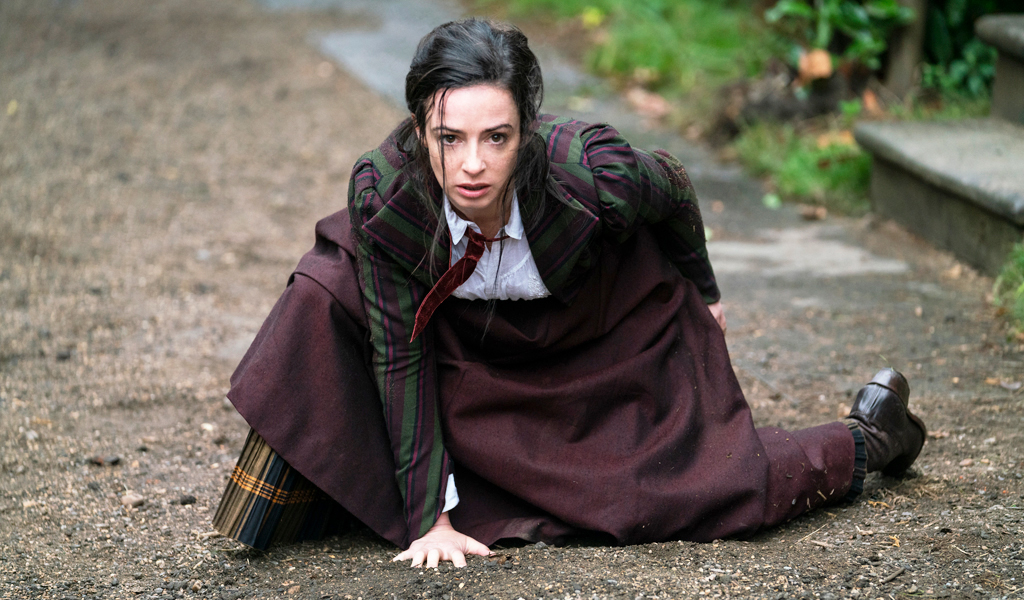
HBO‘s The Nevers arrives as a tough show to review for a few reasons: (1) The show lands with many of the (frankly appealing) pluses that one would expect from the showrunner of Firefly, Dollhouse, and the Buffy series; and (2) The series finds itself saddled with the baggage of the guy who created those same beloved series. Sadly, there’s no way to separate those two statements because Joss Whedon’s particular quirks, his sensibilities, and his favorite tropes run throughout the first four episodes screened for critics. Imagine attempting to take the Ryan Murphy factor out of a Ryan Murphy show, you know? The same arguably goes for Vince Gilligan, Shonda Rhimes, Matthew Weiner, and Aaron Sorkin. Each has a style and an aesthetic and a tonal beat that’s rather distinctive, so it’s hard to separate these artists from their work. In the case of Whedon, that spells a very awkward situation for an expansive series (and his first premium cable outing) that likely could have been his jubilant return to TV.
Whedon, however, stepped down (last fall) from The Nevers as showrunner — while citing exhaustion and the difficulty of running a show during a pandemic — after production on the first half-season that will air in the coming weeks. His move arrived amid mounting allegations about his previous on-set behavior (on Buffy, Angel, and Justice League) by multiple actors, who have described him as “toxic” and “hostile,” along with “abusive” and “unprofessional.” New showrunner Philippa Goslett finished post-production on The Nevers and shall carry the show forward. Whether the series will continue to feel Whedon-esque or morph into a different creature (if that’s even possible because he practically injected his DNA into it) remains to be seen.
Right now, it sure feels like a Whedon joint. This places the show at a crossroads even before it’s launched, even if the man himself has left the building. That is to say, Whedon (who created and wrote the pilot, which he directed, along with a few other episodes) played his greatest hits here, given the callbacks to his previous works. Those signature touches lead The Nevers to delight in genre-bending (like Firefly doing the Western thing in space) and transporting us to an unfamiliar world (in this case, supernaturally-affected Victorian England) with plenty of steampunk-loving, sci-fi-obsessed touches for fans to dig. We’ve also got a leading lady, Laura Donnelly, who’s pushing back against period-drama conventions (much like Buffy ripping apart horror tropes) by being a corset-sporting butt-kicker. (Also, Whedon had nothing to do with creating the Black Widow pose, but it’s really hard to look at this still and not think about how he directed — and handled lady-stuff in a not-fantastic way within — The Avengers.)

Donnelly (who is poised to breakout after her Outlander turn) portrays Amalia True, who’s tasked with running an orphanage-type establishment for The Touched, a largely female bunch who acquired superpowers (called “Turns”) as the result of a mysterious, celestial-bound event that went down a few years ago. All of that is well and good, and the premise is a captivating one, lending itself to a massive cast of ensemble characters — their Turns range from the ability to see energy (as with Amalia’s right-hand woman, Penance, portrayed by Ann Skelly) or spontaneously heal or hurl fireballs or speak in nearly limitless languages or simply be, like, a giant — that aim to fill out a comic book-like side of the story. Yet of these superpowers feel superfluous, and rather unnecessary to main plot threads. Then there’s all of the side stories, like a serial killer (Amy Manson, who will remind people of a Buffy character) with a villainous following; and a few grumpy detective and brothel offshoots, all on top of the Victorian period-drama stuff with social repercussions like classism, genderism, and many other -isms, which the show aims to subvert but (so far) takes a Cliff Notes approach. Also and damn, The Nevers feel mighty congested.
In short, The Nevers is a lot (the principal cast includes a few dozen actors), and it’s trying to do a ton of things while only doing a few of them well. Telltale Whedon dialogue? Check. Elaborate sets, costuming, and (mostly) slick special effects? Got that too, and it’s all happening for what is essentially an X-Men-like establishment going up against forces who wish to annihilate The Touched’s existence. The predominant class of wealthy white men fear variants and deviants and immigrants and, most of all, women with a scrap of power. Again, though, the mutant-tangential play on X-Men is derivative of Whedon’s previous body of work (he wrote The Astonishing X-Men comic series), so The Nevers keeps on feeling like Whedon’s self-erected altar to himself.
Tough stuff, really. The show attempts to wrap its arms around too much, and for whatever reason, the initial driving creative force didn’t follow through, even before his departure. Too many threads and offshoots exist, lots of underdeveloped characters linger, and the show’s filled with plot holes. Much of this could be remedied, but is there enough goodwill for Whedon so that people will stick around and wait? And with him out of the picture, will people who still have goodwill for him even want to stick around? These things could be as simple as giving a better reason why Amalia kicks butt. Her “turn” is that she can see a few seconds into the future, but this does not explain her agile moves. Amalia ain’t the MCU’s The Taskmaster, who’s able to mimic the moves of his prior opponents. We’re simply supposed to accept that Amalia can do these things. And even this logical gap could be forgiven due to good intentions — Whedon likes to see women kick butt — but the problem is this: those intentions feel hollow these days.
There’s a seeming emptiness within the former showrunner’s painstakingly cultivated reputation as a feminist, which has fallen to pieces in recent years with much of the Justice League cast voicing concerns with his on-set demeanor. Meanwhile, both Laura Donnelly and Ann Skelly have defended their experiences with Whedon on this project; it is worth noting that the guy has not been disciplined or charged for alleged misbehavior.
Yet it rubs the wrong way that Whedon resurrected his butt-kicking-female thing shortly before Angel and Buffy star Charisma Carpenter gave negative accounts of how he treated her behind the scenes. All of this judginess on my behalf might seem to be too much. After all, lots of downright criminal people do create art that’s embraced by the masses despite their wrongdoings. Yet my gut feeling is this: yes, there are instances where one can separate the artist from his work, yet The Nevers feels so quintessentially “Whedon” that it’s nearly impossible to not think of him during most moments. Add that to him leaving the show that carries his undeniable fingerprints, and things look rough.
That’s especially the case since The Nevers could have been HBO’s next Game of Thrones-style event series. Not that HBO is hurting, since several recent limited series have been big audience and critical hits. This might have been a contender with a showrunner who’s fully in the zone to wrap their arms around this massive clock of a show, with all its moving parts. That sounds very Watchmen, I know, but it’s not. Instead, we’ve got a dodgy clock that’s not running properly but still happens to be correct twice per day. There’s a lot of fun to be had with The Nevers, but it’s still an untidy fiasco with a steampunk elephant lurking in the wings.
HBO’s ‘The Nevers’ premieres the first of six episodes Sunday, April 11 at 9 pm EST. The final six episodes of the season will air later this year.
0 Commentaires